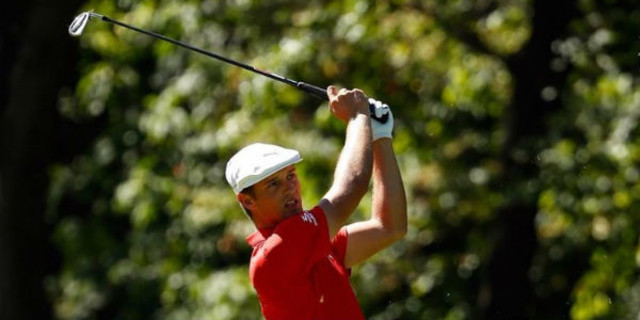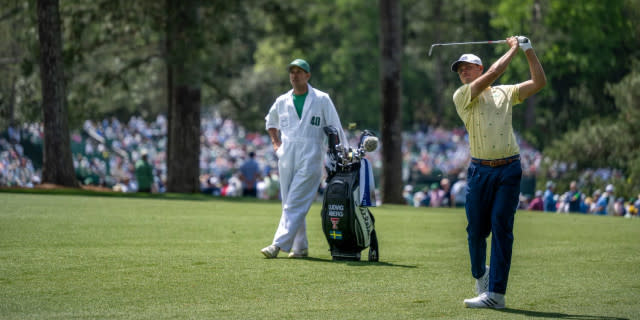
Slowing the Game Down
Article by Golf Writer Alex Picken
Last Sunday saw the golfing scientist, Bryson DeChambeau claim his second PGA tour victory in just his 60th career start at the 2018 Memorial Tournament. Against a field of big names and experienced winners, DeChambeau battled through in a 3-man playoff to seal another PGA Tour title. His performance undoubtedly highlighted him as a big-name player on tour and announced him as a serious contender to become a potential major winner in the near future.
Deservingly, DeChambeau was littered with celebratory comments and congratulations for his brilliant performance on all forms of social media, however, many golfing fans and spectators had also been complaining about the length of time the final group had been taking to complete their round, raising the question of whether this group that included DeChambeau should have been possibly penalised for consistent slow play.
Featured Content
The final grouping consisted of DeChambeau, Patrick Cantlay and Kyle Stanley. Due to the possibility of inclement weather, they were due to tee off at 9:30am, and be thankful that they did…
To many fans and spectators dismay, this 3-ball did not complete their final round until 3:00pm, a shocking total of 5 hours and 30 minutes to play their final 18 holes.
Before the group had even set foot on the course, many commentators and golfing fanatics had mentioned how long this round may turn out to be, as both DeChambeau and Cantlay are renowned for being particularly slow players on tour. DeChambeau is typically a very methodical and technical golfer, he and his caddie can be seen speaking about every possible aspect and outcome of a particular golf-shot, a process that can be very time consuming. Cantlay on the other hand, tends to be very tentative and fidgety player when he is over the ball, one spectator on Twitter shared a video of Cantlay repeatedly looking at the pin 13 times at address before taking his shot. Unsurprisingly and possibly long overdue, on the 13th hole the group was told by rules officials that they had now been put on the clock and needed to pick up the pace, however, any significant and noticeable changes to the pace of play were very hard to spot, and no penalties were given to any player in Sunday’s final group.

Naturally, golf isn’t renowned as a sport that delivers non-stop action or constant excitement. Golf is unique in the way that certain dramatic moments or unbelievable shots have the ability to captivate the audience’s attention for a split second of magic. Unfortunately for the viewers, as the level of competition for each tournament gets tougher, the pace of play seems to dramatically slow down. Ultimately this leads to many rounds on tour that are around 5-6 hours, causing many viewers to become bored or disillusioned with the length of time it takes for players to finish 18 holes, potentially leading to fans switching off the sport if they don’t have the time or patience to sit through nearly 6 hours of golf, hoping and waiting for something exciting to happen.
But should we expect this? In recent years tournament prize money has been excessive to say the least, the Memorial is an example of this, DeChambeau’s play-off victory earned him a little over $1.6 million for his 4-days work. With that in mind, can he really be blamed for taking longer periods of time than your average amateur golfer, if every putt or chip he has on the course constantly has hundreds of thousands of dollars riding on it. Another problem is the lack of any commanding officiating for this issue, in professional golf we constantly see players given warnings or groups put on the clock for slow play, however, only on the rarest of occasions do we see actual penalties given out to players by officials. Therefore, is it really all the players fault if this is constantly the case? If every player knows they are not going to receive a penalty for slow play, why not exploit this loophole as much as possible to gain an added advantage when it comes to making important golfing decisions. Without the risk of being penalised on the course, and the only possible repercussion being a few nasty comments from a complete stranger on Twitter later that day, are they really to blame for towing the line regarding pace of play if it gives them the best possible chance to win?
On the other hand, the alternative argument seems pretty simplistic, there is no need for any round of golf to be in the excess of 5 hours, especially in the professional setting. Professional tour players now have resources on the golf course that most amateurs can only dream of, all of which in theory should help speed up the pace of play. Playing golf courses littered with thousands of spectators typically means that when the occasional shot is hit off line, rarely do we see professionals hunting down their ball in the trees or rough, as the majority of the time the spectators will gladly do this job for them. In theory, the use of caddies should also help with the pace of play on the course, but in most cases, it seems to have a negative effect when it comes to speed. Instead of a caddie speeding up play with their help on yardages and club selections, most golfers tend to abuse this resource and talk over every aspect of a golf shot with their caddie, creating situations where a player may stand over his/her shot for several minutes, debating with their caddie on what exactly to do, slowing down the round for everyone else.
The pace of play in professional and amateur tournaments is something that is continuously discussed by golf fans, nearly all of which agree that slow pace of play needs to be addressed and changed. Slow pace of play is one of the factors why many people will dislike a certain sport. For example, I actively dislike American football, purely because I do not enjoy spending 3-4 hours of my day watching a sport that includes on average, around 11 minutes of actual action. This is why I can also understand people’s boredom when it comes to golf. If you do not fully understand and appreciate the game, why would you spend 5-6 hours of your day watching the sport in the hope of an exciting moment occurring out of the blue?
However, the future of golf is beginning to look a little brighter and hopefully a lot quicker… During the recent 2018 NCAA Division 1 golfing championship in Oklahoma, in the 3 tournament rounds that were played, 7 golfers were issued with penalties for slow play. While many may see penalising young, aspiring golfers in their major college tournament as somewhat harsh, personally as a college golfer myself I think this is generally a positive thing which should be publicised more. All golfing officials need to start being stricter and more consistent on this issue, players and coaches were warned at the start of the competition, and therefore no exceptions or excuses were given during the round. In my opinion, the tougher restrictions for slow play worked. On a difficult and long (7,460 yard) golf course these college players kept a very respectable speed and produced a wonderful tournament, providing spectators with moments of tremendous skill and talent. They did not have thousands of spectators searching for their lost balls, they did not have caddies carrying equipment for them and they played in conditions just as tough and as long as any PGA or European Tour golf course. So, if a bunch of college kids adhere to these rules, why can’t experienced professionals receive the same treatment?
Shot Clock is a Start but Slow Play Needs to be Tackled Properly
The European Tour is also trying to combat this issue with the introduction of the 2018 Shot Clock Masters, which is being hosted at Diamond Country Club in Vienna, Austria. The intention of the competition is fairly obvious given its name, improve the pace of play in professional golf tournaments with the introduction of a shot clock and imposed penalties for players who take too long to play. The tournament is the first of its kind and it is a statement from the European Tour that the pace of play in golf is to be taken seriously and possible adaptations and changes can be made to help improve this situation. While the majority of fans seem to like the idea, not all players seem to be convinced as of yet and watching the event will certainly be a good indicator as to which players relish the experience or faulter at the demand of the shot clock.
While most golfing fans tend to agree that slow play needs to be stamped out the game, it would seem that the golfing governing bodies and certain professional players still need convincing. However, with the help of stricter officiating and innovative tournament ideas, the game of golf does appear to be changing for the better when it comes to addressing slow play. Although they are most definitely not there yet, as more attention is being drawn to the issue by television commentators and viewers all over social media, the potential for a quick change of pace seems very possible.

Be part of the action with a selection of unique golf tournament experiences, from playing in a pro-am with the stars to watching the action at golf’s most illustrious events. Whether it’s the Masters or The Open, The Ryder Cup or WM Phoenix Open, build your own bespoke package with the experts at Golfbreaks.com.









